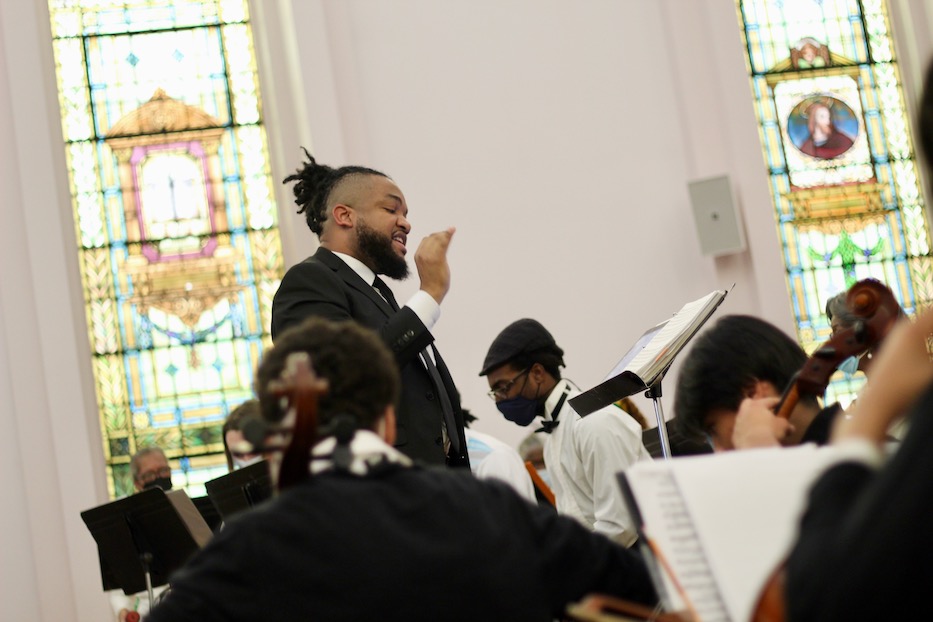
Culture & Community | Downtown | Dr. Martin Luther King Jr. | First and Summerfield United Methodist Church | Music | St. Luke's Steel Band | Arts & Culture | Music Haven | Arts & Anti-racism
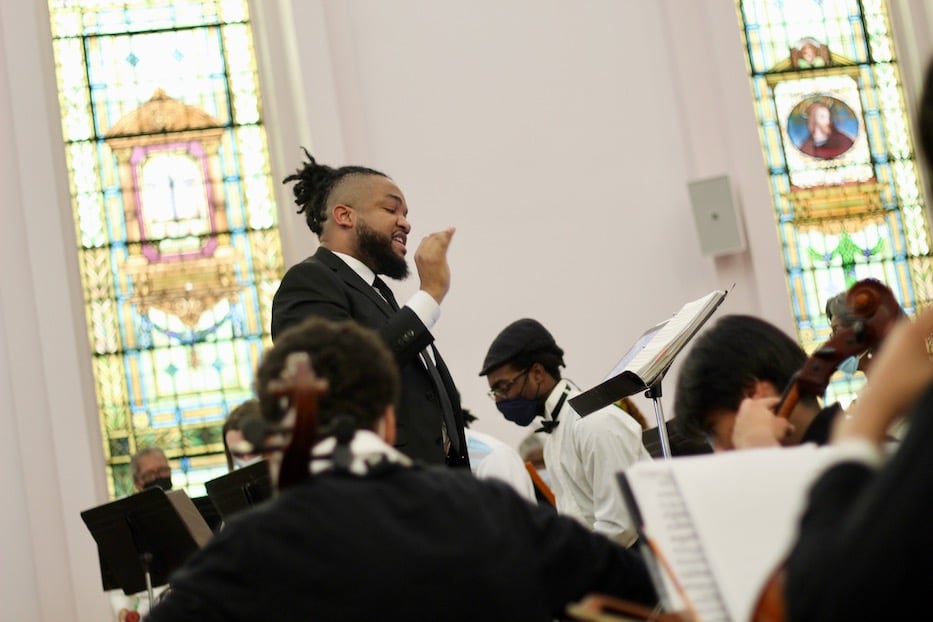
Kenneth Joseph, who has directed the St. Luke's Steel Band since 2011. Founder Debby Teason, who is still the group's liturgical music director, was in the audience. Lucy Gellman Photos.
Steel pan vibrated through the core of First and Summerfield United Methodist Church, knitting sound into prayer. Violins, violas and cellos unfolded across the carpet, the sound enmeshed with the bounce and roll of the pan. Sheaves of mid-afternoon sunlight streamed in through the stained glass, as if they had been called to appear. Aaaaaa-men! sang over 100 voices, all in unison.
Strings and steel summoned the revolutionary, intersectional, and too-often whitewashed spirit of the Rev. Dr. Martin Luther King, Jr. on Monday, as Music Haven and St. Luke’s Steel Band came together for their first Martin Luther King, Jr. Day concert since January 2020. Bathed in the church’s honeyed light, musicians honored King the activist, labor organizer and sharp-tongued orator, carrying his legacy into the present.
First and Summerfield felt like the right setting: it is home not just to a sanctuary congregation, but also to the labor union Unite Here!. It marks the concert’s 11th year, and the first since the beginning of the Covid-19 pandemic in March 2020. Over 150 people attended.
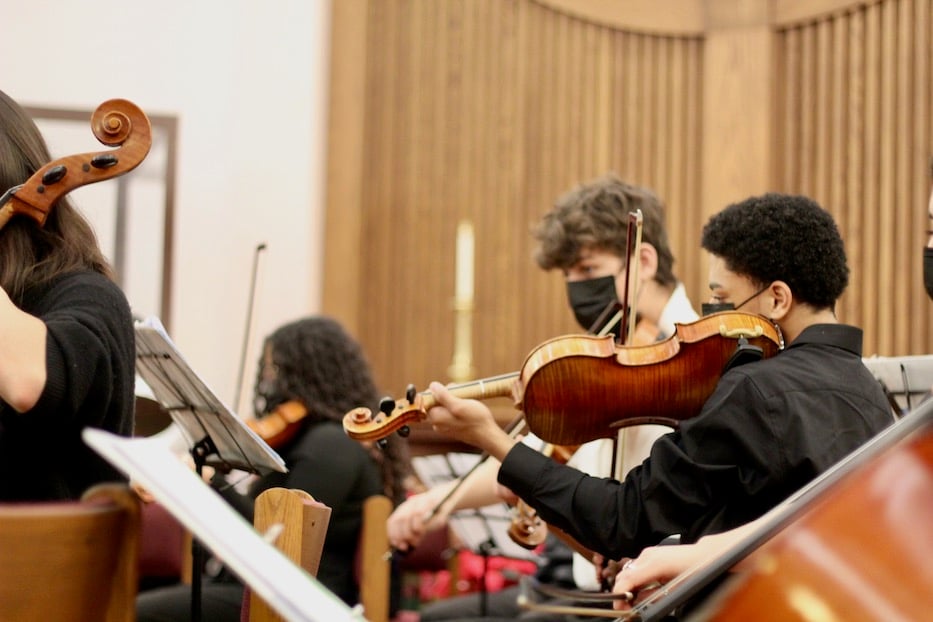
“He fought for freedom and for Black folks to have a voice, and it just feels good being here today and just celebrating him,” said Kenneth Joseph, who has directed the steel band since 2011. “Performing for me, music is just such a blessing. While playing today, [I was] just thinking about him and what he would have done in his latter years of life. Hopefully he would have been doing more things like this.”
The tradition, which this year highlighted Music Haven’s Harmony In Action orchestra, has taken on a life of its own. In January 2011, the concert started with a few Music Haven students and steel band members at St. Luke’s Episcopal Church on Whalley Avenue, where the band holds its weekly practices and concerts. In over a decade, the event has traveled from St. Luke’s to Christ Church on Broadway Avenue to First and Summerfield, and has included spoken word poetry, guest speakers, community awardees, visiting vocalists.
Joseph said that it took on an extra weight this year, with the passing of steel band founding business manager Edward Mapp. Mapp, a lifelong New Havener who died in April of last year, was an early and consistent champion of the steel band and the growing collaboration with Music Haven. This year will mark a lot of firsts without him, Joseph said, adding that he was still with the group in spirit.
“It feels amazing coming back,” he said. “For me, he [Dr. King] is about working hard, moving forward—like, what’s your next step? Trying to keep on being the best at whatever it is.”
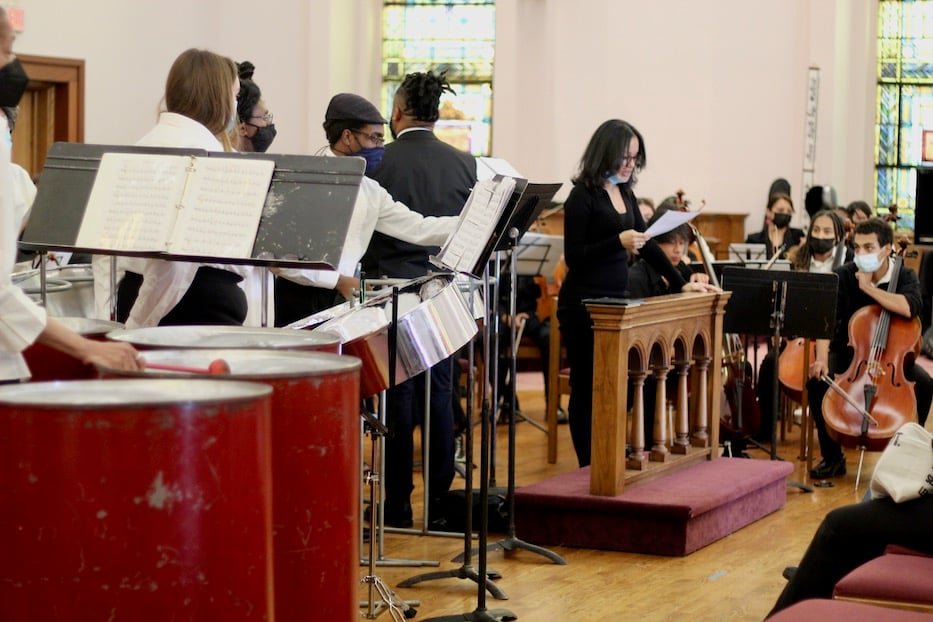
Throughout the afternoon, musicians both amplified King’s advocacy for the rights of Black people, Indigenous people, workers, and immigrants—and his warnings around the violence of white supremacy and capitalism in America. No sooner had applause faded from Bill Withers’ “Lovely Day” than Ayana Salahuddin rose from a thicket of violins on the right side of the sanctuary, and came forward.
A junior at New Haven Academy, Salahuddin has been playing with Music Haven for years, and rediscovered her love for the violin while making it through the pandemic with the organization. In her hands, she held words that King delivered 56 years ago at Stanford University, in his speech entitled “The Other America.”
“A riot is the language of the unheard,” she began, her voice ringing over the first rows unassisted. “And what is it America has failed to hear? It has failed to hear that the promises of freedom and justice have not been met—”
In the audience, attendees held on to every word, some straining to listen at the back of the sanctuary. As she read, a listener could close their eyes and see peaceful protesters pepper sprayed in the New Haven streets, thousands marching against police brutality, school boards working double time to ban Jerry Craft and the 1619 Project, public schools in Bridgeport and New Haven not receiving the same funding as Greenwich and New Canaan.
Even in a building filled with musicians, it was quiet enough to hear a pin drop. Behind her, her peers steadied their instruments. She took a breath, and whole decades of redlining, eviction, and de facto segregation spilled and stretched between the sentences.
“And it has failed to hear that large segments of white society are more concerned about tranquility and the status quo than about justice and humanity.”
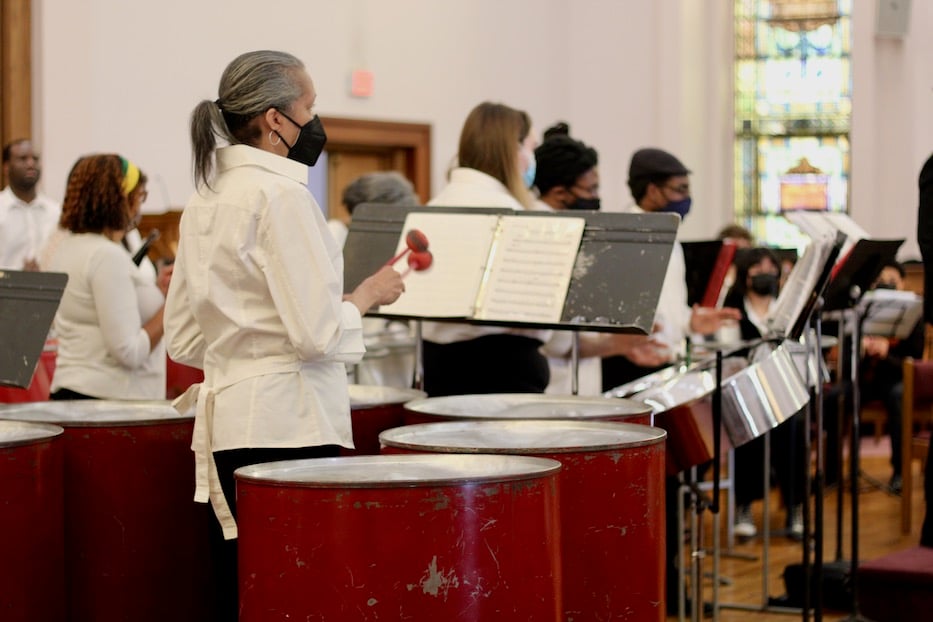
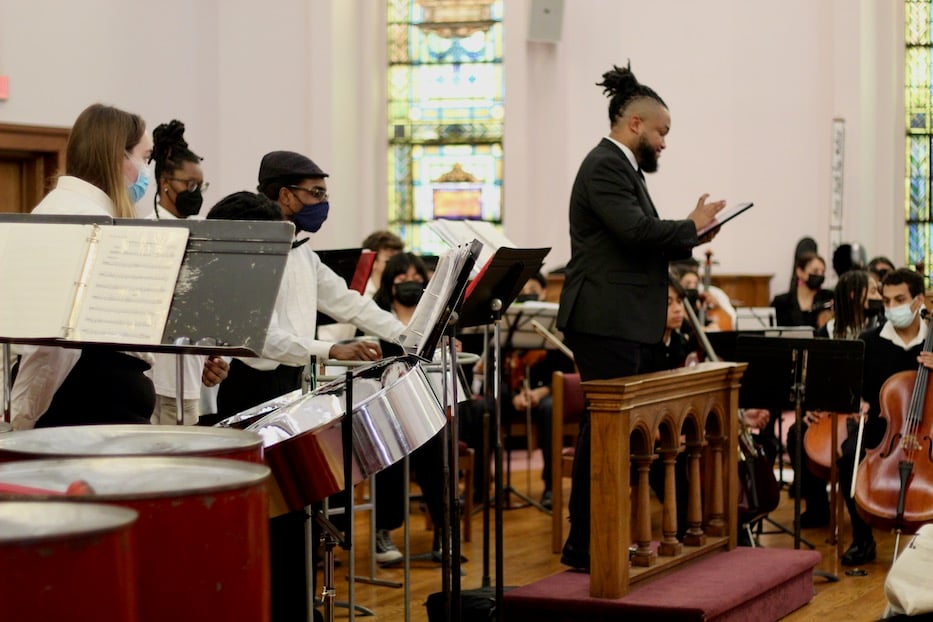
Taking his place back in front of the audience, Joseph harnessed King’s long-held belief that another world was possible, if those in political and financial power were willing to bend to it. During his lifetime, King pointed to the United States’ ability to end poverty, drawing a through line from enslavement and the forced removal of Native people from their land to capitalism, social stratification, and a class system that overwhelmingly penalized poor people.
As musicians eased into Withers’ “Lean On Me”—an old favorite, and one of the last pieces the two groups played together in 2020—Joseph pulled the room into that vision of a more unified world with no words at all. Turning toward the audience, he raised his hands above his head, beaming as he brought them together, and then gestured for the audience to join in. Taking his cue, attendees began to clap in unison. Smiles rippled through the crowd; a few Music Haven parents began to dance in their seats, shoulders and torsos pumping. Musicians, some leaning over their instruments, let themselves rock gently to the sound.
So too as they unspooled Sam Cooke’s “A Change is Gonna Come,” stretching out the notes before calypso and "Canon in D" entered the fray. There was a balance—the ache and the possibility, the bitter and the sweet—and musicians knew to hold it. Inspired by the words of Sojourner Truth, violinist Leah Carrillo championed women’s rights, her voice sending a beam of light through the sanctuary as she spoke. Moments before, student Nathalie Tejada had focused on the sheer injustice of white comfort, finding in King’s words a description that decades later still rang true.
In a sweeping arrangement of Charles L. Washington’s “Bartók Meets Monk” for strings and steel band, steel pan started at a sort of ringing whisper, yielding to strings. Violin and cello led the way, with a steady, throbbing note that repeated over and over, as if it were tracking a pulse. In the audience, a listener could feel the tension building, strings working their way forward as steel crested beneath them.
And then it was as if a curtain had parted, and viola stepped out onto the floor alone. Steel and strings stilled for a moment, their echo still hanging in the air. Viola sang out, the sound pulsing in the space. A beat, and steel pan filled the air once more, coming toward the audience in thick, bouncing waves of sound. Strings called out in response, echoing the cry they had just heard.
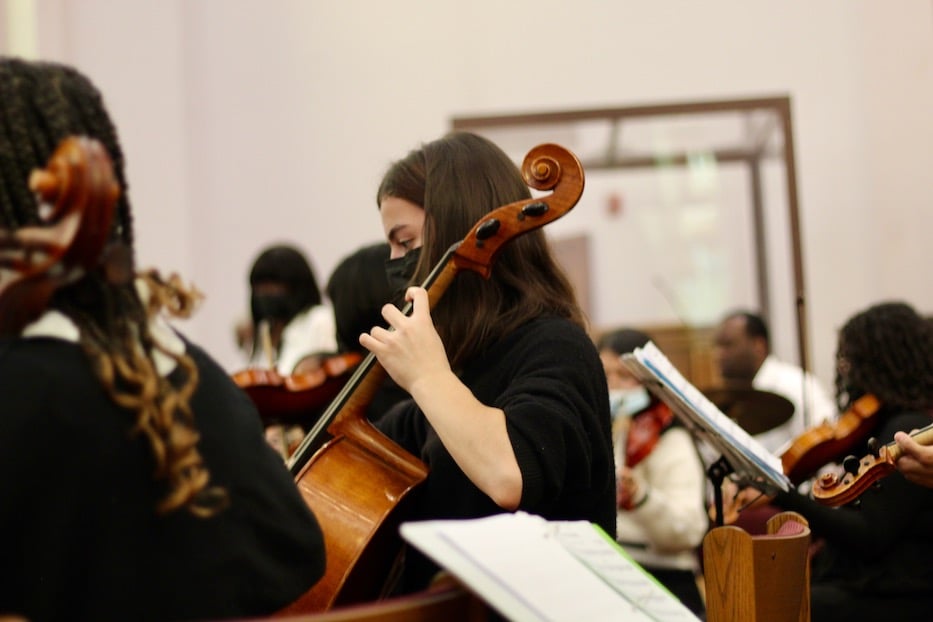
At another, Joseph introduced David Rudder’s “High Mas,” arranged for steel and strings for the first time this year (the steel band has performed it many times before, but never alongside Music Haven). Rudder’s original version, composed for Carnival in Trinidad and Tobago, is written in praise of Trinidad’s freedom and historic traditions. “So it’s really a prayer,” Joseph said.
As he prepared to conduct it in the church, Joseph explained that he was going to need some help. At the end of every verse—he faced the audience and raised his arms to demonstrate—he explained that he would need attendees to join in on the word Amen. Somewhere in the first three rows, a tiny voice rose toward the rafters with a premature Amen! Laughter rippled through the audience.
“Yes!” Joseph laughed. “If he can get it, you can get it.”
No one had prepared the audience for the explosion of sound that came next. Joseph lifted his hands, and mallets were tapping out the lyrics— Ou a a oo a a, I love meh country!—with a tin-edged, round jingle that caught between bells and laughter.
On the bass steel drum, masked players pounded out a sound that shuddered and undulated, as if the drums themselves were ventricles. Joseph gestured with one hand for the strings to come in, then faced out toward the audience. His palms fluttered the command, the audience singing.
Before the concert ended, Joseph asked attendees to stand for James Weldon Johnson’s “Lift Every Voice and Sing,” often referred to as the Black National Anthem. Over a decade in, the song is a part of the concert that has not changed for years; it is muscle memory to many of the young musicians who have grown up with Music Haven. As they flowed into the first verse, dozens of audience voices, then hundreds, sang along. By the final verse, at least three generations were singing in unison. It was hard not to feel, for a moment, completely held in the space.
As they packed up their instruments after the concert, students Leah Carrillo and Maelle Davenport said they were both grateful for the chance to reflect on King’s legacy. An eighth grader at Engineering and Science University Magnet School (ESUMS), Carrillo painted King’s advocacy as part of a long line of civil rights heroes, who also include figures like Richard and Mildred Loving.
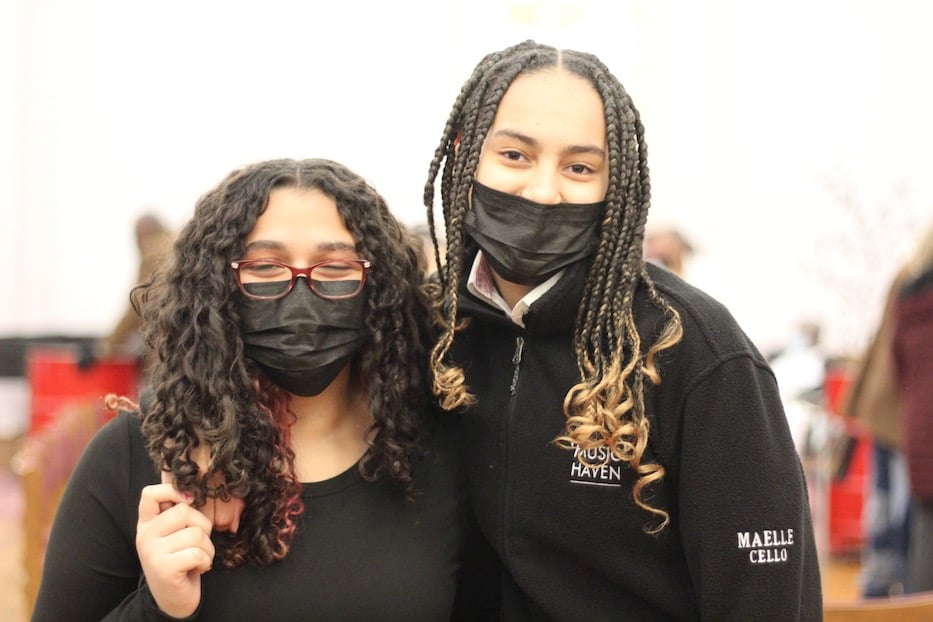 Leah Carrillo and Maelle Davenport. Both are eighth graders; Carrillo attends ESUMS and Davenport is a student at Betsy Ross Arts Magnet School.
Leah Carrillo and Maelle Davenport. Both are eighth graders; Carrillo attends ESUMS and Davenport is a student at Betsy Ross Arts Magnet School.
“My parents probably wouldn’t be allowed to marry, and that’s kind of crazy,” were it not for the civil rights movement, she said. “So I like how we get to celebrate that we’re all together now. Playing music, it lets me show my emotion, it lets me express how I’m feeling. It’s a language that everyone knows. Things like music and art—it can bring us all together no matter what.”
“For me it means celebrating Martin Luther King, Jr.’s legacy and the steps he took for society to become what it is today,” chimed in Davenport. “For me, music is all words. It’s a way for me also to express myself without having to talk or show that. It feels great that music can also make a change.”
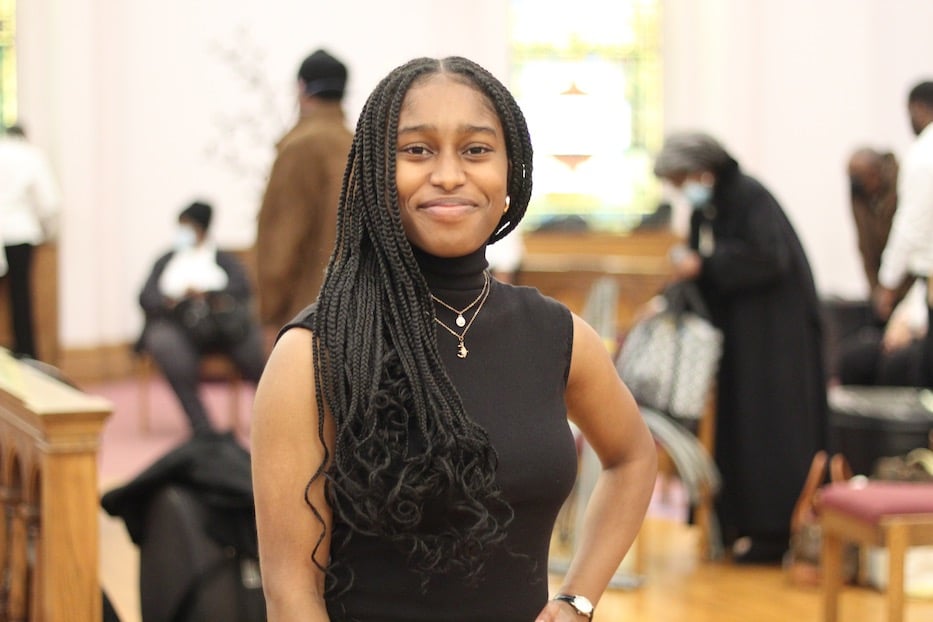
Ayana Salahuddin: "We’re going toward something. We’re working towards something."
Salahuddin, who is currently a junior at New Haven Academy, said that she could feel King’s words moving through the music. She looked to Sam Cooke’s “A Change Is Gonna Come,” another one of the group’s longtime favorites. Three years ago this week, the musician Thabisa Rich carried the piece as she sang along. Monday, it didn’t demand any extra orchestration. The piece was full just as it was
“It has really high notes, it’s a whole bunch of emotional roller coasters,” she said. “Music can show us how we’re feeling at the time, and music reflects the times. I would say that ‘A Change Is Gonna Come,’ all those high notes, we’re going toward something. We’re working towards something. I feel like you can embody what he felt when you play. You can feel the emotions. And once you begin to feel the sympathy for everybody, you work towards doing something for the better.“
“For me, MLK Day means everybody learning about one another and coming together to fight for something that brings us together, in equality for all,” she said. “So I would say, fairness.”
Learn more about St. Luke’s Steel Band here. Learn more about Music Haven at their website. Watch more videos from the concert here.

